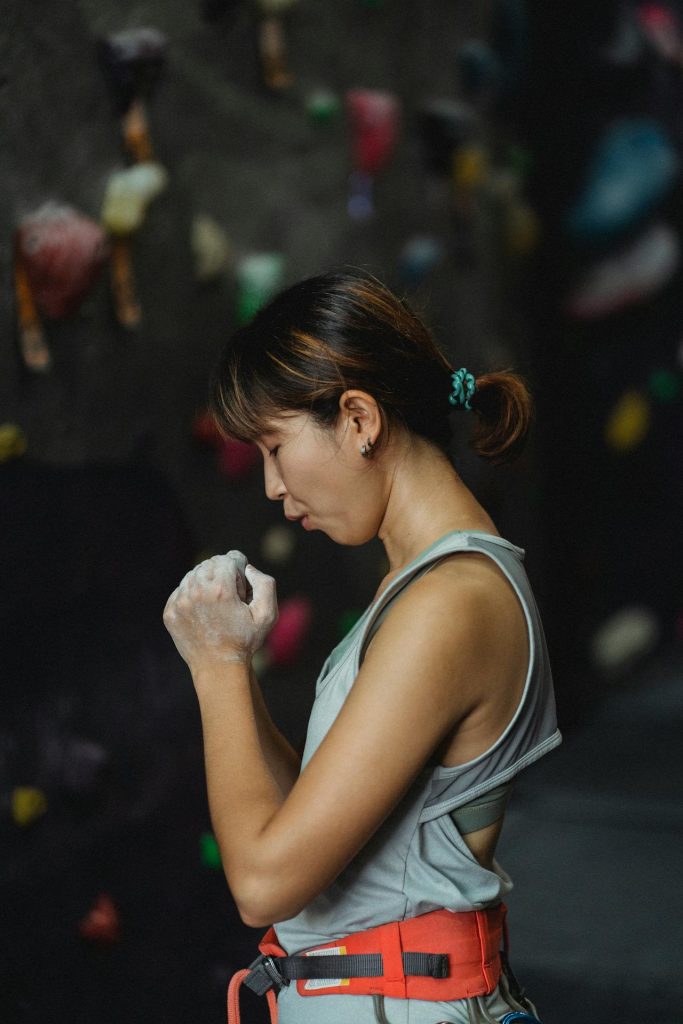Your fear of heights may inhibit you from pursuing your dream of rock climbing. I remember when I first started climbing, the height of the walls seemed insurmountable. What may seem like a fun and exciting way to push your body is instead seen as a death-defying and outrageous stunt. But climbing doesn’t have to be scary!

Two distinct differences between a fear of heights are Acrophobia and Basophobia. Acrophobia is an extreme or irrational fear of heights, especially when one is not particularly high up. This phobia affects roughly 2-5% of the population. In terms of numbers, that’s over 16.5 million people! Basophobia, on the other hand, is a natural fear typical of most humans and mammals. The difference is that Acrophobia deals with the fear of the height itself, while Basophobia encompasses the effects of falling.
Overcoming your Fear of Heights
To overcome your fear of heights, you must first recognize that you fear heights and nothing more. Acrophobia can only indeed be diagnosed by a mental health professional, but self-diagnosing can also be possible. One practical step you can take is to start by climbing a small wall or boulder. This will help you to gradually acclimatize to the height and build your confidence.
For some, Acrophobia occurs when you’re at extreme heights; for others, it can happen when standing on a step stool. The fear can be debilitating, causing you to freeze up and need to be rescued.
While Basophobia, the fear of falling, is a bit different, it can be overcome similarly. It requires extensive practice and patience, but the journey will ultimately lead you to live out your climbing goals. Imagine the sense of accomplishment and personal growth you’ll experience when you conquer your fear of heights.
Bouldering Exercises to Help Your Fear of Heights
If you have an incredibly intense fear of heights, reach out to a mental health professional for help. None of this information is provided by a medical professional and may not be the steps for you.
- Learn downclimbing – Adding downclimbing to your repertoire is a great way to build climbing confidence. If you can master how to downclimb, you can climb your way out of scary scenarios. Climb a boulder problem (or as high as possible), then downclimb it. Try to use the same holds you used to climb up. You’ll gain confidence in climbing when you know you can downclimb your way out of any situation.
- Practice falling—Practicing falling off the wall is crucial for climbing higher, harder, and safer. While rock climbing is inherently dangerous, risks can be minimized by increasing one’s knowledge of one’s ability. Start with refining your technique while just standing on the mats. Bend your knees, cross your arms over your torso, and lean back into a roll. Once you have this down, climb one step up a boulder and take a fall. Repeat this until you feel comfortable going higher and falling. To enhance this exercise, you can practice falling in less-than-ideal scenarios. Climb up the wall and drop a little sideways onto the mats. Practicing falling in different directions will help you build confidence to try more challenging moves higher up the wall.
- Try more challenging climbs – Before moving to this step, you should practice falling from different heights in different orientations until it isn’t super scary. Try a climb that may be at your limit. What you’re trying to do here is fall off with little control. Sometimes, your foot slips, or you reach for a hold and can’t grasp it. That will help you become familiar with unexpected falls, building your confidence to try even harder climbs.
Overcome Your Fear of Heights on a Rope
If you desire climbing with ropes and more gear, you can use the same exercises to overcome your fear of heights. Climbing on a rope requires more trust in outside forces, though. You need to trust the rope, your harness, your belay partner, and every piece of gear associated with rope climbing. Remember, all climbing gear is designed and tested to ensure your safety so you can focus on enjoying the climb.
To build that trust, you will need to perform the same exercises until you can let go of the wall at the top. Trusting gear can be intimidating, but remember that everything made for climbing has undergone rigorous tests and must meet specific standards for safety. This reassurance should help you feel more confident in your gear and focus on your climbing, not your fear.
Slowly work your way up to where you take more significant falls, and before you know it, climbing will be at the forefront of your mind, while falling is at the back. Remember, every step you take to overcome your fear is a step closer to achieving your climbing goals. You’ve got this!

Recent Comments